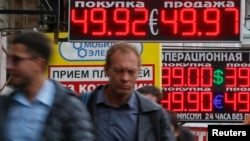Russia's economy will fail to grow at all in 2014 and inflation will reach a four-year high, a Reuters poll of economists showed on Tuesday, as Western sanctions over Ukraine bite.
Economists cut back their growth forecasts for Russia this year as the escalating Ukraine crisis prompted waves of Western sanctions and a massive outflow of capital that are both hurting Russian companies' ability to raise finance.
The latest poll, the first since a cease-fire in Ukraine between government forces and separatist rebels, suggests the economic fall-out from the crisis for Russia is far from over.
“Geopolitical risks remain, as the situation in eastern Ukraine is far from a peaceful solution and any escalation could trigger additional sanctions,” said Vladimir Miklashevsky, Russia economist at Danske Bank.
Western governments are expected to keep existing sanctions in place for the foreseeable future to keep up pressure on Russia after it annexed Crimea earlier this year and gave support to pro-Russian separatists in eastern Ukraine, a charge it denies. The current cease-fire in Ukraine remains highly fragile.
“De-escalation (of military action in Ukraine) only prevents the further tightening of sanctions, it's not about removing the sanctions that have already been imposed. And those sanctions are painful,” said VTB Capital economist Vladimir Kolychev.
Without access to Western finance, Russian companies are being forced to cut back on investments to reduce their debts. At the same time, they are squeezed by high local interest rates as the central bank struggles to stabilize the sinking ruble.
“To reverse this situation, sanctions will either have to be lifted or the central bank will have to ease monetary policy significantly, and that is not in prospect before at least the middle of next year,” Kolychev said.
The last time economists anticipated zero or negative growth for Russia over a full year was in 2009, when the economy slumped in the wake of the global financial crisis.
The country's economy only grew by 1.3 percent in 2013 and by 3.4 percent in 2012, already disappointing compared with growth of around 7 percent annually before the 2008-9 crisis.
Analysts predicted that the economy would contract by 0.3 percent in the fourth quarter of 2014 and recover only gradually over the next twelve months, with growth in annual terms rising to 0.2 percent in the first quarter of 2015, 0.5 percent in the second quarter and one percent in the third quarter.
Stagflation
In another sign of Russia's deteriorating economic health, the analysts polled forecast that inflation would hit 7.9 percent by the end of 2015 - the highest end-of-year outcome since 2010 and well above last year's 6.5 percent.
That is gloomier than last month's 7.2 percent prediction, and above the government's prediction of 7.5 percent, which has also been revised sharply upwards.
Inflation is shooting up largely because of Russia's ban on many food imports in retaliation for Western sanctions. It is also affected by a plunge in the ruble, which hit all-time lows this week and has shed around 20 percent against the dollar this year.
The analysts expect inflation to rise further above eight percent in the first half of next year, and fall only gradually to seven percent by the end of the third quarter.
Stubbornly high inflation means that any interest rate cuts by the central bank - one way to boost the stagnant economy - will remain a long way off.
None of the polled analysts expected the bank to cut rates this year. Out of fourteen who made a rates forecast, four anticipated a further rate increase by the end of this year, with the rest predicting a hold.
“I'm not expecting any further rate cuts, but perhaps some more measures to aid forex liquidity and borrowing for banks and corporates,” said Informa economist Christopher Shiells.
“I feel that the central bank will remain under pressure not to hike rates, even as the ruble remains weak... due to the weak outlook for economic growth.”
A majority of analysts expected the bank to cut interest rates around the middle of next year, although views differed on whether this would begin in the second or third quarter.
Economists have also revised down their forecasts for the ruble significantly, although they nevertheless expected to see a rebound from its present levels near all-time lows.
The poll predicted the ruble would be worth 37.5 against the dollar by the end of 2014, a whole ruble weaker than last month's poll forecast of 36.5, but stronger than the ruble's present value of 39.50.
A year from now the ruble was seen at 38.2 against the dollar, 47.5 against the euro, and 42.21 against a dollar-euro basket, implying a modest rebound from today's levels.





